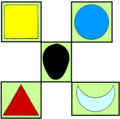Tattva facts for kids
Tattva is a Sanskrit word that means 'thatness' or 'truth'. In many Indian schools of philosophy, a Tattva is like a basic building block of reality. Think of it as an important part of everything that exists, sometimes seen as an aspect of a deity or a fundamental principle.
Contents
What are Tattvas?
Tattvas are the core elements or principles that make up the universe and everything in it. Different Indian philosophies have their own ideas about how many Tattvas there are and what they represent. They help explain how the world works and how we experience it.
Tattvas as Building Blocks
Imagine the world is built with special Lego bricks. Each Tattva is like one of these unique bricks. They combine in different ways to create everything we see, hear, touch, taste, and smell. They also form our minds and feelings.
The Five Great Elements
One common way to understand Tattvas is through the five great elements. These are often seen as fundamental Tattvas:
- Earth (Prithvi): Represents solidity and stability. It's about things that are firm and strong.
- Water (Jala): Represents fluidity and connection. It's about things that flow and bind together.
- Fire (Agni): Represents transformation and energy. It's about heat, light, and change.
- Air (Vayu): Represents movement and lightness. It's about things that move and are subtle.
- Space or Ether (Akasha): Represents emptiness and vastness. It's the space where everything else exists.
These five elements are not just physical things. They also represent qualities and energies within us and around us.
Tattvas in Different Philosophies
Different Indian philosophies have their own lists of Tattvas. For example, some systems might have 25 Tattvas, while others have 36 or more. These lists often include not just the physical elements but also aspects of the mind, senses, and even higher spiritual principles.
Understanding Reality
Studying Tattvas helps people understand the true nature of reality. It's a way to explore how the universe is structured and how our own minds and bodies fit into that structure. It can lead to a deeper understanding of ourselves and the world around us.
Images for kids
See also
 In Spanish: Tattva para niños
In Spanish: Tattva para niños
 | John T. Biggers |
 | Thomas Blackshear |
 | Mark Bradford |
 | Beverly Buchanan |


